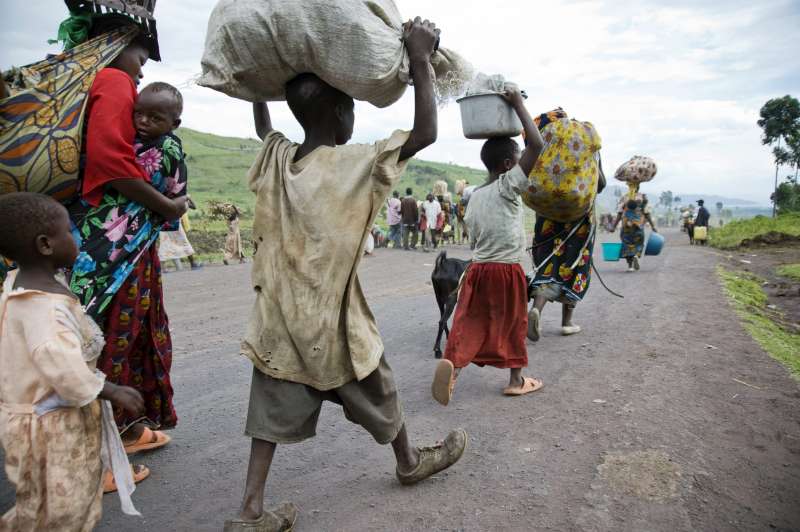The slow pace of development in Africa has been blamed on the failure of political leadership to steer the ship of the continent in the right direction. Unfortunately, African nations go through myriads of elections ushering in successive political administrations most of which lack the political will and a sense of responsibility to deliver any meaningful good to the people. Uncomfortable with the state of affairs, Africans watch successive administrations waste irredeemable time accentuating themselves as the lord over the people, thereby abdicating the role as stewards; exploiting the same people they were meant to serve. Whereas the social contract between business and society is usually highlighted in literature as well as in social campaigns, the inalienable socio-economic contract between the government and the governed is largely drowned under the over-bearing influence of politics and propaganda. Social activists feel safer attacking corporates who fail to give-back part of their wealth to society but fail to adumbrate the obvious absence of social responsibility on the part of government in administering the commonwealth for the good of all.

The concept of social responsibility stems from the foundational reality that the society owns the social assets on which both business and governance thrive. Whether Corporate or Political, social responsibility underscores the critical role the society as a major stakeholder plays in the success of businesses and governments, either as ‘customers’ or as ‘the governed’. Therefore, value creation (economic and non-economic) becomes a conscience -repayment that both businesses and governments must regularly make to the society. The responsiveness and consciousness towards this mutual indebtedness is measured as Corporate Social Responsibility (CSR) when businesses are involved or Political Social responsibility (PSR) when the counter party is government. Whereas, the former concept is ubiquitous, the latter is nearly non-existent.
Framing the Structure of PSR
Borrowing a leaf from the ideas of renowned CSR theorist, Andrew Carnegie, the government is actually a steward of the people, managing the commonwealth of the people as a public trust under their stewardship. This thought aligns wholly with the democratic tenets whereby the people surrender their mandate to elected representatives. To exercise the mandate on their behalf in taking key decisions around management and allocation of political and economic resources of the state. From the economic and political perspective, the expectations of the people from the government become those of stewardship and accountability. The concept of Political Social Responsibility (PSR) therefore, is a call for governments to employ tact and due care in managing the affairs of the state in order to create value for the people as key stakeholders; embrace stewardship and accountability as a responsibility that guarantees visible transparency on how the affairs of the state is conducted. As in the case of CSR, the principles of political social responsibility include sustainability, accountability and transparency.

Sustainability as a political good consists in the ability of a political administration to promote a healthy political environment that guarantees the right of the people to choose their leaders and enjoy successive political administrations without interruption. Sustainability as a social good also requires political administrations to maintain, regenerate and even preserve the economic and social assets which they enjoyed, to make same available to succeeding administrations. Political instability, wars and social unrests rank among the top legacies which political administrations bequeath the African society; these legacies in turn obliterate sustainability as a social good in Africa, they also obfuscate sustainable development in the continent.
Accountability as an underlying principle of political social responsibility requires that the government regularly reverts to the governed (the true owner of the mandate) to render account of stewardship. Unfortunately, African leaders once elected become first class citizens and lords of the people; thus, ego and irresponsibility take away every sense of probity and accountability. From key information like financial position of the government to simple information on the state of health and whereabout of the elected representatives of the people, accountability becomes an exclusive preserve unavailable to the owners of the mandate (who in the first place elected the same leaders).
Transparency as a principle of political social responsibility is one single ingredient that can help regenerate the first two if they fail. This is because transparency is delivered through accountability while transparency drives accountability. Where there is transparency, sustainability can be nurtured through a veritable trust base that creates public understanding in times of weakness and secures public confidence in the programmes and policies of government. The absence of transparency in political leadership across Africa is the single highest enabler of endemic corruption in the system.

The State of PSR in Africa
Political leadership in Africa has been without a sense of responsibility and stewardship to the people. Rule of law, human rights, free speech and press freedom have all become scarce in Africa’s democracy; it has been more about the whims and caprices of the leaders and nothing about the will and aspirations of the people. The 2021 report of the International Institute of Democracy and Electoral Assistance (International IDEA) reveals disturbing trends and statistics about the state of democracy in Africa. According to the report, recent trends show a gradual decline in democratic quality in Africa as the number of countries designated as authoritarian now outweighs those deemed to be democratic. This current trend, the report observes, undermines an otherwise remarkable improvement in democracy across the continent. Based on statistics from the report (on a sample of 50 countries), by 1975, 93% of African governments were authoritarian while only a paltry 7% were democratic. By 1985, there were 3 democracies and 42 authoritarian regimes; however, by 2015, the number of democracies grew to 22. Sadly in 2020, with the recent lapses, there were 18 democracies compared with 19 authoritarian regimes and 13 hybrid ones. Still on the timelines, the report noted that while there has been some progress towards overall Representative Government across Africa, an average decline was recorded in Clean Elections; in some cases, there were complete democratic breakdowns as a result of military coups (some of which are a response to citizens’ demand for political change), an ugly development which has carried through to 2022.

The switch in trend from good to bad is indicative of political social irresponsibility wherein power usurpation and political brigandage is the order of the day. Democratically elected administrations outlive their legitimate tenure, wrestling power from the people through coercion and intimidation. Between 2015 to 2020, 13 African countries amended and/or eliminated constitutional provisions in order to circumvent presidential term limits. These administrations do nothing to improve the standard of living or the safety of lives; their preoccupation is power and longevity of power. In total, 34 African countries (68 per cent) were ranked within the world’s bottom 25 per cent in terms of Basic Welfare in 2020, thus highlighting the lack of economic purpose by succeeding governments in Africa. In all, the people of Africa have become mere spectators in the game of political leadership and governance of Africa; value creation is out of the bargain as political gladiators battle for power with stratagem and no strategies.
Entrenching PSR in Africa
Sustainability of democracy, accountability of democratic governments to the people and transparency in the business of governance are necessary ingredients needed to promote political social responsibility. Until these ingredients are in place, true dividends of democracy would be absent in the continent. Promoting a system of political social responsibility among Africa’s political class would be a precursor to the next level of sustainable economic, political and social development in the continent. To achieve this purpose, a vibrant civil society is needed to lead the campaign. Much as political education is needed, the political parties can never be trusted with this responsibility. Members of the civil society, as social entrepreneurs, are well positioned to drive this social goal. It requires mass enlightenment to educate the citizenry on the real essence of government and what to demand from elected representatives. An important lever which the civil society must harness in driving this agenda is Africa’s bulging tech-savvy youth population whose inter-connectedness and global exposure cannot be under-estimated. This section of the population must be reached with mass enlightenment so as to build a future Africa that is alienated from the present comatose, but enabled and equipped to drive the next level of change. The end result is to build a bottom-up participatory civil population that has enough information and awareness to engage government at all levels. Gradually across Africa, the masses are becoming more aware of the power of ballots and are ready to put their ballots into better use. There cannot be a better time than now to raise the PSR campaign.

The CSR Arena is a CSR advocacy and sustainability-reporting-analysis champion. We encourage and celebrate effective CSR and positive social impact by responsible corporate citizens; we celebrate international best practices in sustainability reporting across different economic divides. Our goal is to realize the dream of development scholars that, ‘corporates, more than governments, would bring about the much needed sustainable development across the globe. We partner with FBOs, NGOs, CBOs, governments and corporates to spread the message of sustainable development and corporate sustainability. Our platforms bear tales of good corporate citizenship – grab the microphone that you may be heard. Contact: news@thecsrarena.com




Medicaid Income Planning simplified lookback period rules.